By Ruben Avxhiu
-July 2 and a personal story –
Memorie.al / Exactly 35 years ago, on July 1, 1990, my family began their annual vacation on one of the beaches of Durrës. I believe in the part called “Iliria”. On the 2nd I returned to Tirana. The next day I had the “graduation night”, the last party before the separation, and a tradition for the high schools of the capital. Together with my friend, Gent Demi, we had climbed onto the terrace of my building to talk about the events of the day. Tirana was going crazy. The summer was hot but, even hotter was the massive desire of young people to escape from Albania.
In fact, communist dictatorships had fallen everywhere in Europe and Albania was the last. Everyone said that change was very close. However, it seemed that few wanted to wait. Most young people, more than the fall of the regime, dreamed of escaping to the beautiful world we saw on foreign television. And on those hot summer days, it seemed as if everyone was getting ready to flee.
A few weeks earlier, the Popaj family, who had been holed up in the Italian embassy for years, had finally been allowed to flee to Italy. The event had been a signal to thousands of others that if you entered a foreign embassy, it was possible to flee to the West. My palace was located at the fortunate intersection of “Rruga e Kavaja” and the so-called “Rruga e Ambasadave”, where many of the important diplomatic missions were located, such as the German, French, Greek Embassies, etc.
That evening of July 2, it seemed as if all of Tirana had poured in. They were walking along the street with embassies that was usually asleep and empty. Most were curious, but there were also many who were eyeing the security guards, trying to judge whether they could get over the fence in time to get inside. Dozens of people were already on the other side of the walls. The tension was high. The number of police officers began to increase.
At one point, near dusk, a loud scream was heard. We hung from the balcony with Gent, to see what was happening below, and we saw that everyone was running to leave “Embassy Street”. Someone had given the order to clear it and close it. A police cordon was set up at the entrance to the street. We thought that was the end of it. But the people had apparently not left. They were gathered just a few meters away, and they seemed to be growing rapidly. Then something happened that had not been seen in Tirana for almost half a century. Instead of dispersing, the crowd seemingly rushed towards the police forces, who, caught off guard, retreated in deep panic, to the “Embassy Street”.
There is always a crazy moment that begins to change the history of a country, for better or for worse. Albanians had been living in fear for years, so much so that even many of those who seemed to have lost everything, still did not speak or act openly against the state. For a while, it seemed like an ebb and flow. Sometimes the crowd pushed the police crowd into the forbidden street, and sometimes the police pushed them back to the “Kavaja Street”, until the people disappeared into the alleys, only to reappear with the same enthusiasm with which they accompanied the crowd towards the embassies.
The entire building, like the rest of the neighborhood, was on the balconies watching in shock this extraordinary development. Of all the others, our building had the best view. At one point, as the crowd was retreating, the police managed to pull out a young man, who perhaps slipped or fell and was left behind. They surrounded him and beat him savagely. Blood rushed to my head and I started cursing them.
They raised their heads. I instinctively retreated so they wouldn’t see me. But in the meantime they were cursing them from other balconies. I was on the fourth floor. A pensioner on the floor above shouted to the police: “Shoot the fascists!” They jumped at me again: “What do you say, you masked man,” I shouted to my neighbor. I wasn’t the only one exchanging curses. A mini-civil war had begun between the balconies, while the battle below was raging. As midnight approached, suddenly, a truck with a covered body stopped in the middle of the crowd, a little further from the Theater/Church.
At that moment, the leather cover at the back was lifted and several young, tall and strong boys began to jump out of it. With three or four blows, they knocked several men to the ground and shot them at close range. Then they joined in. There were almost 20 of them. Their physical superiority caused panic in the crowd. Unlike the police, these were much more efficient. There we saw for the first time those who would become known as “sampists”. Special Forces selected and prepared for extraordinary cases. The regime’s secret weapon. Young people fell to the ground unconscious and these men picked them up in their arms and threw them into the truck, as if they were sacks of flour.
Meanwhile, police reinforcements had arrived from many directions. The streets were probably no longer safe to hide in. Films of the time and stories from the wartime were full of stories about how illegal communists were hiding in the basement houses of Tirana, protected by the people. Now it was those who wanted to escape the communist regime who was finding shelter in the basement houses of the alleys that led to “Rrugë e Kavajës”. Chased by police and SAMP members, they knocked on the doors of people they did not know and the Tirana families let them in. The courtyard of one house was full of young people, who had hoped to enter the courtyard of an embassy and now, did not dare to go out into the street.
Below our building, the police were better organized. A man, who may have been Dilaver Bengasi, organized the movements. At his signal, all buses going to or coming from the Combine began to be stopped. All the young people who were caught inside the bus were taken out, beaten and arrested. There was no other reason for the police to be outside at midnight, unless you were out to take part in the chaos. I remember the first boy who got off the first bus. A policeman was waiting at the bus door. Without coming down the stairs, he reached out, grabbed him, lifted him into the air, like a rag, and dropped him to the ground. His scream was terrifying.
The neighbors were all on their balconies, but no one reached out to see, they just listened in silence to the horror. When everything seemed to have calmed down and the crowd had dispersed to the house and the prison cell, one of the leaders, who I later read was the criminal Zylyftar Ramizi, gestured from my balcony. Or so it seemed to me. “Take them too,” he said. Genti and I went inside immediately. We turned off the lights. I saw several policemen gather and head towards the entrance. We had seen what had happened to those who had been arrested. It was easy to be brave from the top of the balcony, when the end was still unknown. Although, more than bravery, it had been an emotional outburst.
Someone knocked lightly on the door. We were silent. I heard the familiar voice of my grandmother, who lived on the second floor of our building. I opened the door. “Turn off the lights and be quiet,” she said. She had a padlock in her hands. I closed the door and heard her lock me in from the outside with the padlock. Meanwhile, noise and commotion could be heard throughout the building. Somewhere on the third floor, my grandmother seemed to have exchanged words with the police officers who were going upstairs: “Where are you going, mother?” they said. “To my house,” my grandmother said with a sharp gyno-castration. They let her go down.
The uniforms finally arrived at my door. They knocked loudly. They shook the padlock. And they said something. They also went upstairs. When the noises died down, I approached the window, terrified, to see them coming out. They were forcibly dragging Jani from the second floor, a father of two children, and I think Elisabeta, on the third floor, an opera singer, if I’m not mistaken. They had also taken the side of the citizens, from their respective balconies. I saw Zylyftar Ramizim raise his head and I pulled myself out of the window. My knees were shaking. But we had escaped safely.
Genti slept at my place that night. Although to be honest, no one could sleep. We talked until morning. As soon as it was dawn, we went out and ran to our friend Kel Demi’s house to talk about the events. From there we went to the prom night. In a hall downstairs, in the “Arbëria” Hotel, on the Boulevard that was then called “Dëshmorët e Kombit” and that has now been renamed “Zogu I-rë”. Our plan was to eat and drink as if for the last time together, maybe get drunk, dance and sing, to end our “youth” with a bang, before heading to university or work, according to each person’s fate.
However, everyone was numb. No one more than the two of us, who almost “celebrated” the prom in a cell, eating wood. We were all eager to share with each other the latest news that was bubbling up all over Tirana. One told of a father who had been left in the crowd, with his young son, when the violence had started. The boy was crying, terrified by the sight, and the father trying to lie to him: “It’s a bad movie, dad, don’t be scared, they’re playing a movie.”
Slowly, the cognac and the frenzy, the music and the melancholy of the closing of a beautiful chapter in life, overtook us all. I especially remember singing loudly the Italian song “Che sara (Che sarà)” by Ricchi e Poveri, with the spicy verses that went with the day: “Paese mio ti lascio, io vado via” and which continued with the refrain “Che sarà, che sarà, che sarà/Che sarà della mia vita chi lo sa?/So far tutto o forse niente/Da domani si vedrà/E sarà, sarà quel che sarà!”
We really didn’t know what was going to happen to our lives. It was a natural crossroads in life, but it was more than that. The whole country didn’t know what awaited it. In fact, fate didn’t wait long to prove to us how unpredictable everything that was coming was. At one point, the music stopped and a man in a suit informed us that the evening had been canceled due to the foreign and degenerate music we were using. The order was firm. Who could blame the young people who wanted to escape? Who were jumping over walls and running towards the entrances of embassies. It wasn’t even a matter of ideology or regime.
This was a country that had failed economically and in many sectors of life, but in the meantime it found time to eavesdrop on how we dressed, how we cut our hair, and what music we listened to! I returned home and saw that a kind of curfew had been imposed and my building had remained within the restricted area. I told the police that I lived there and they let me go, but they watched me with suspicious eyes. I learned that the arrested neighbors had returned to their homes without any apparent problems. But for many young people who were arrested, the fate was not known for some time. There was talk of execution, of bodies being thrown into Mali me Gropa, somewhere near Tirana.
My parents had found a way to call from the beach. They wanted me to return urgently. The next day I left. There was no other conversation on the beach, except for news from Tirana. By staying there, I missed the period when the state gave up protecting the embassies and for a few days, allowed anyone who wanted to enter them to enter. Then it closed the road again. The events of those days were first brought back to my mind by the memoir “The Last Domino Stone” by Ilir Demalia, one of the protagonists of those days, who had entered the German Embassy.
Later, I read the version from the other side of the barricade, in a book written by Dilaver Bengasi, who had led the police action. Today, fortunately, Albanians have a complete study of the events of those days, rich in documents and references, which provide the full range of developments. It is “The Embassy Crisis: Albania in 1990”, by Afrim Krasniqi, a must-read for anyone who wants to learn more about that period of our history.
I will return to this topic a little in the coming days to remember a few things on the occasion of the 35th anniversary of the event. Fortunately, everything was resolved in the end. The thousands who entered the embassies were allowed to leave and go to the respective embassies where they had entered. It is true that being on the beach, I did not witness the events that took place so close to my home, on “Embassy Street”, but I had the opportunity to see something else that Albanians did not manage to see: the boats carrying refugees, fleeing our country towards the horizon.
All the beachgoers had gone out to the shore and were silently watching the scene. No one made a sound. Some were crying. A large official rally in “Skënderbej Square” denounced the escapees as traitors to the nation. The regime did its best to act as if nothing had changed. The walls of the embassies were raised and fortified, to make it impossible for this event to happen again. But the breach had been fatal. Six months later, the communist regime surrendered and paved the way for political pluralism. Memorie.al




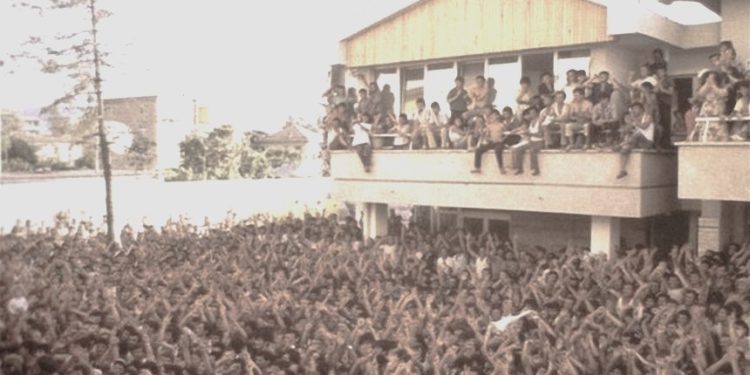
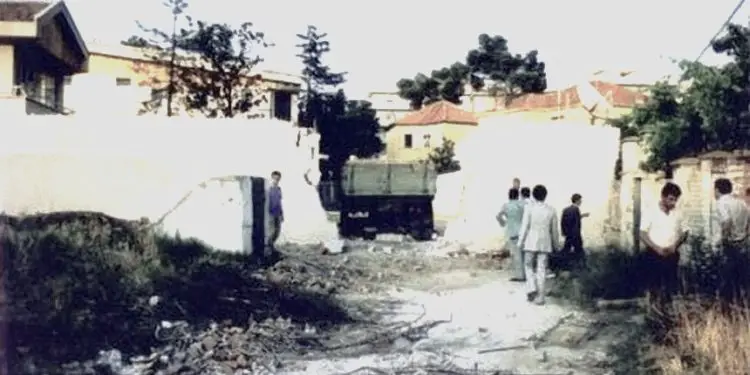
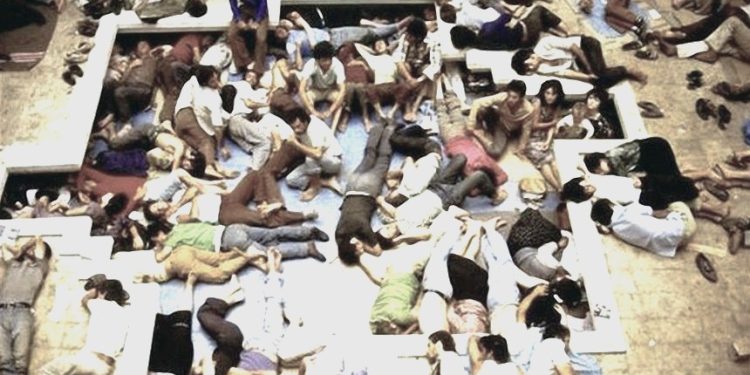
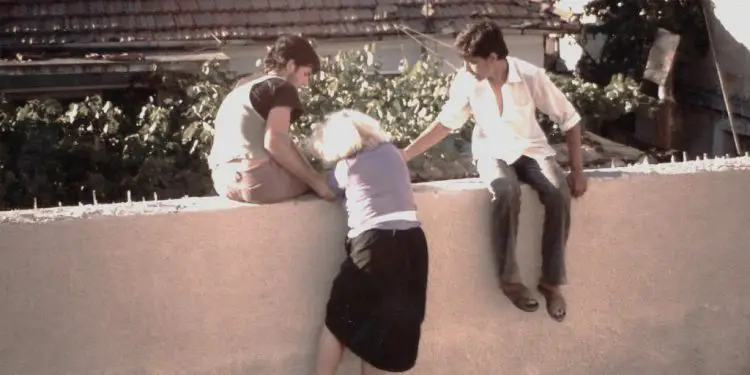
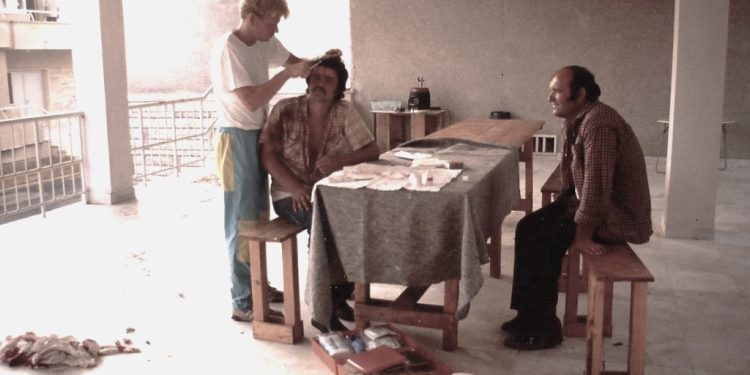
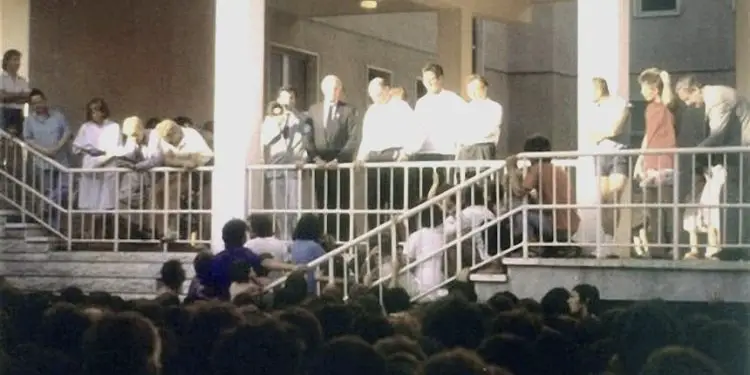


![“The ensemble, led by saxophonist M. Murthi, violinist M. Tare, [with] S. Reka on accordion and piano, [and] saxophonist S. Selmani, were…”/ The unknown history of the “Dajti” orchestra during the communist regime.](https://memorie.al/wp-content/uploads/2026/02/admin-ajax-3-350x250.jpg)
![“In an attempt to rescue one another, 10 workers were poisoned, but besides the brigadier, [another] 6 also died…”/ The secret document of June 11, 1979, is revealed, regarding the deaths of 6 employees at the Metallurgy Plant.](https://memorie.al/wp-content/uploads/2026/02/maxresdefault-350x250.jpg)


